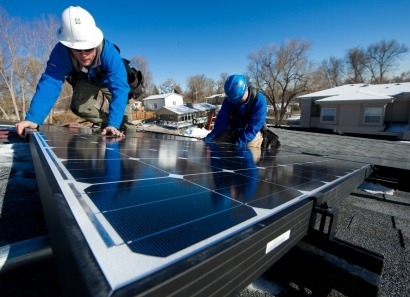
Despite an 11 percent dip in global investment during 2013, an abundance of opportunities in new renewable energy markets, new technologies and new sources of capital signal brighter times ahead, according to the annual report by EY.
China closed the gap on the US at the top of the index with a record-breaking 12GW of solar capacity in 2013, expanding its consolidation effort to accelerate its market recovery. Germany remains in third place but there is concern over its announcement of subsidy cuts and watered-down renewables targets by the new coalition government. Japan has replaced the UK in fourth place due to its rapid solar market growth and a burgeoning offshore sector while the UK has also suffered from political infighting and mixed policy measures.
“The 2013 fall in global investment reflects another challenging year for the renewables sector, with policy uncertainty in particular reducing investor appetite across many markets” said EY’s Global Cleantech Leader, Gil Forer. “However, it also reflects a maturing sector, with falling technology costs filtering through to lower investment requirements: increasing the dollar power per megawatt. We must now therefore focus on what needs to be done to maximize investment and deployment in light of the fact renewable energy is becoming increasingly cost competitive.”
France and Australia have fallen down the table due to prolonged energy strategy consultation and anti-renewables legislation while India has jumped to seventh place with ambitious targets and a series of large-scale projects announcements. A plethora of new projects awarded in 2013 have also meant Brazil and South Africa moving forward in the index.
Resilience, efficiency and effectiveness, technology beyond generation, new markets and innovative financing have been identified as fundamental to industry growth in 2014. Governments and business will need to consider the value put on energy sector resilience, in light of the industry’s historic inability to absorb economic, political and environmental shocks. The energy debate should be depoliticized in order to support long-term policy measures and undertake a transparent and objective assessment of the value of energy to determine the most resilient energy mix. Centralized energy planning will help to counter the uncertainty of the market while fostering private sector participation.
“In short, “efficiency” and “effectiveness” need to be this year’s buzzwords” said Ben Warren, EY’s Global Cleantech Transactions Leader. The market should be setting its sights on: value chain integration, consolidation on a global scale, repowering, transaction and capital efficiencies and technology improvements. Renewable energy is now a truly global market, and stakeholders must develop a global strategy and a global supply chain, be flexible to market changes, and be willing to go in search of new markets.”
The report has also highlighted the need for more robust transmission infrastructure and efficient distribution channels following deployment challenges in markets such as China, Japan, Germany and South Africa during 2013. More investment is needed in grid management, digitalized supply and demand management, distributed applications and the commercialization of storage technology in order to avoid transmission bottlenecks and intermittency challenges.
Emerging markets are now attracting around half of new investment in the sector and investors will increasingly focus on those markets characterized by economic and energy demand growth, significant natural resource, an energy security imperative and an absence of infrastructure legacy. Ethiopia, Kenya, Indonesia, Malaysia and Uruguay are among the markets to watch in 2014.
For additional information:

